Will RAF Spitfires and Hurricanes fly again?
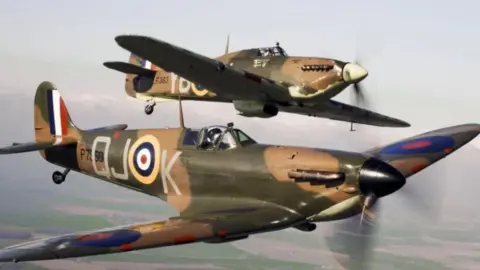 MOD via PA
MOD via PAFour months after a Spitfire crashed killing its pilot Sqn Ldr Mark Long, the RAF's Battle of Britain Memorial Flight's fighter planes remain grounded. As the investigation continues, there are doubts over the future of these iconic aircraft.
The Spitfire and Hurricane are credited with winning the Battle of Britain during World War Two, and decades on still guaranteed to thrill crowds at air shows.
For months those aircraft operated by the RAF's Battle of Britain Memorial Flight (BBMF) have remained in their hangars as investigators from the Defence Accident Investigation Branch (DAIB) continue to probe the cause of the crash.
However, Spitfires and Hurricanes in private ownership are still permitted to fly, with the Civil Aviation Authority (CAA) telling the BBC there was "insufficient evidence to justify a fleetwide grounding".
Immediately after the tragedy, the RAF announced a "temporary pause" in flights by the remaining aircraft in the fleet. It has now told the BBC the Spitfire and Hurricane would "return to flying only when it is appropriate and safe to do so", adding the safety of its personnel is "paramount".
It would not, when pressed, provide a guarantee the aircraft would resume flying or give timescales on the investigation.
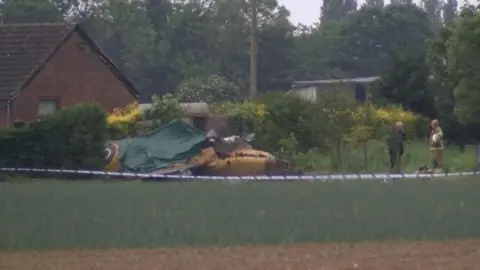 Jake Zuckerman/BBC
Jake Zuckerman/BBCTerry Holloway, a retired RAF group captain and a former BBMF engineering officer, said he had "extensive" knowledge of both the Spitfire and Hurricane, and said he was left wondering if BBMF's fighters would take to the skies again.
He said: "It's quite understandable that the Ministry of Defence, in these risk-averse times, would wish to pause flying until the cause of the crash is identified, but more than three months on they [the Spitfire and Hurricane aircraft] are still grounded.
"They have either still not found the cause or they have [identified the cause] but for some reason are not disclosing it. Either way, I find it astonishing that it's taking so long.
"I am surprised that they have not made any kind of announcement about the progress of the investigation."
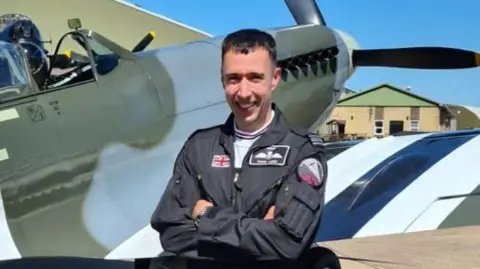 RAF/BBMF
RAF/BBMFThe CAA added it was in "regular contact", with both BBMF and Rolls-Royce, which makes the Merlin engines contained in some Spitfires and Hurricanes.
Mr Holloway said, in his opinion, it would be "relatively easy" to establish the cause of a crash.
"I see no reason why it should be taking so long," he added.
Mr Holloway cited another crash, which happened on 11 September 1991, when he was part of BBMF.
"Hurricane LF363 crashed as we were making our way to an airshow in Jersey," he said. "I was onboard on BBMF's Lancaster at the time. The pilot survived.
"Despite the aircraft being badly damaged by fire, a defective camshaft was quickly established as the cause. A remedial modification resulted and that was that. We continued flying."
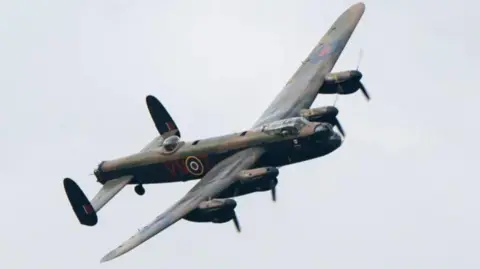 PA Media
PA MediaIn July, BBMF announced its Avro Lancaster PA474 - a heavy bomber - had been cleared to return to the skies, although officials said this followed an "extensive pre-planned depth maintenance activity".
That work took place over the winter. The Spitfire crashed in May.
In August, DAIB investigators asked the public for any videos and pictures of the Spitfire after it commenced flying in April 2024, following its winter maintenance programme.
Mr Holloway said the decision to allow BBMF to fly the Lancaster - and not the fighters - might point towards an issue with the Spitfire's engine.
"The military has deemed it safe for the Lancaster to fly, presumably because it has four engines as opposed to the single engine fitted to the Spitfire and Hurricane.
"There are countless stories of the Lancaster safely landing on one engine during World War Two. The Merlin is actually a very simple, piston engine. It's not a complicated engine," said Mr Holloway.
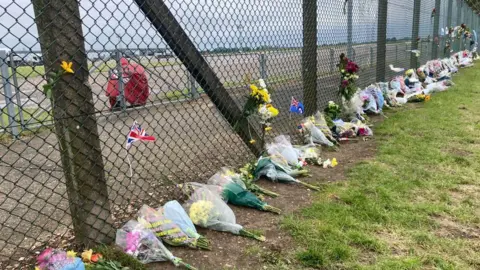 Jo Makel/BBC
Jo Makel/BBCMr Holloway said it was "very sad" the fighters remain grounded.
"They missed the D-Day 80 commemorations, the King's Birthday and now likely the Battle of Britain anniversary [15 September]," he added.
Sir Gerald Howarth, president of both the British Air Display Association and the Historic Aircraft Association (HAA), said the aviation community continues to "grieve for the loss" of Sqn Ldr Long, a highly respected and experienced pilot.
However, Sir Gerald said he was "curious" why there has been "absolutely no move" from the Civil Aviation Authority (CAA) to ground Spitfires and Hurricanes in private ownership. He said there are about 40 such aircraft.
'Spark of enthusiasm'
Sir Gerald, who is also a former Conservative MP for Aldershot, stressed the importance of displays involving such iconic aircraft as the Spitfire and Hurricane, stating they provide a "huge source of entertainment and the public", which he said "creates a spark of enthusiasm" in young people who go on to enjoy careers in aviation.
What do the authorities say?
A spokesperson for the CAA said: “We have been in regular contact with the Battle of Britain Memorial Flight (BBMF) and Rolls-Royce since the tragic accident in May.
"At this stage, there is insufficient evidence to justify a fleetwide grounding and we understand an operational pause is standard procedure for the BBMF following an incident. We continue to engage with industry and await the outcome of the military investigation to take any action if needed.”
An RAF spokesperson said: "The safety of our personnel is paramount.
“The BBMF Spitfire and Hurricane will return to flying only when it is appropriate and safe to do so.”
They added it would be inappropriate to comment further while the investigation was ongoing.
Listen to highlights from Lincolnshire on BBC Sounds, watch the latest episode of Look North or tell us about a story you think we should be covering here.
